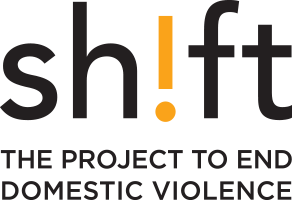Patterns of behavior associated with domestic violence do not stem from a single source – nor do the solutions. Effective primary prevention strategies must be nestled in a human rights framework that uses an ecological approach that addresses oppressive structures and systems, while enhancing supports for communities, families and individuals. Designing strategies that build individual skills while addressing the settings, environments and structures in which we live is essential for stopping the perpetration of violence.

OUR WORK
Our Approach

Working to stop a deeply-rooted issue like domestic violence takes courage and time. At Shift, we begin each research project or partnership by unpacking our understanding and beliefs about this complex social issue. From there, we begin to examine how violence intersects with other forms of oppression like gender inequality, racism and homophobia. Our process evolves to search for evidence-informed policies and practices that have been proven to reduce or prevent violence within the context we are working in. Through an integrative approach, we then mobilize mechanisms to disrupt negative harmful beliefs and attitudes, and implement programs and practices – with the ultimate goal of changing systems and structures that support violence.
Much of what we do is dedicated to conducting research, building capacity, supporting knowledge integration and advocating for policy change.

Here are some examples of how we do that:
- We conduct and disseminate research to inform and support decision-making processes aimed at prevention.
- We co-create prevention programming, social policy and legislation with diverse stakeholders.
- We facilitate discourse change at local, regional, national and international levels.
- We bring forward evidence-based approaches and models that can be integrated into prevention plans, strategies, programs and initiatives.
- We provide leadership and support to communities, organizations, collectives, and governments as they move through the change process to include primary prevention research.

Through strategic partnerships with government and community leaders, producing policy recommendations, and advocating for reforms to current laws, Shift works to transform the conditions that perpetuate violence. We promote evidence-based strategies that reimagine violence-free systems and environments, building roadmaps toward those futures.
Men & Boys as Allies, Violence Disrupters and Change-Makers
The focus of our work is to support and nurture more non-violent men and boys to become allies, partners, violence disrupters and leaders in the movement to stop domestic violence and violence against women. We believe that working with men and boys will have a transformative effect not only on the lives of women and girls, but also for men and boys. Starting in 2011, Shift has invested significantly in engaging men and boys as a primary prevention strategy.
Our focus is in three areas:
- Changing the policy environment which includes large social structures and systems that reinforce male violence.
- Partnering with community leaders and organizations to include men and boys as part of their violence prevention strategies.
- Co-creating opportunities and community of practices within the human service sector to transform the work to be more inclusive of men and boys.
Research shows that the use of power and aggression in childhood and adolescence increases the risk of interpersonal violence (IPV) in adulthood. Researchers have found that bullying changes with development into other aggressive behaviors, such as sexual harassment and dating aggression. Therefore, we believe intervening with children and youth to stop the reinforcing use of power that develops through bullying interactions along with promoting healthy relationships lays the foundation for building healthy relationships throughout the lifespan. Childhood and adolescence are important periods of development where family connections, schools and communities need to be safe and nurturing environments and at Shift, we are striving to help change and support the social conditions that support children and youth.

Any violence prevention work happening on Indigenous land must take up a decolonial lens and happen hand-in-hand with Indigenous communities. Family and sexual violence against Indigenous peoples are a direct result of ongoing colonialism and the denial of self-determination for Indigenous nations.
Just about anyone can play a role in the prevention of domestic violence – including informal supports such as family, friends and neighbours. In fact, research shows that informal supports are willing to intervene during a domestic assault when they have been provided with education and capacity that builds their confidence and skills to intervene appropriately.
(Also referred to as LGBTQ)
While some patterns of domestic violence in gender and sexually diverse relationships are similar to those in heterosexual relationships, domestic violence manifests itself differently in Gender and Sexually Diverse (GSD) communities which presents specific challenges for practitioners and policy makers.
There are many intersections between domestic and sexual violence, including a profound impact on victims. Primary prevention strategies for sexual violence are important, particularly as sexual violence is vastly under-reported, difficult to detect, deter and punish due to the stigma often associated with being a victim of sexual assault.


